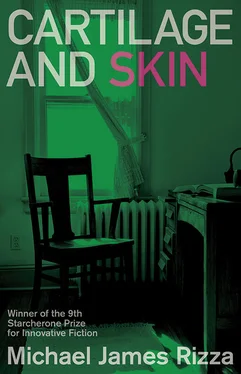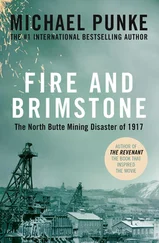“No problem,” she said. Her round head swiveled forward as she nodded.
As I headed toward the restroom, I heard her whisper to her co-worker. They both giggled. Of course, it was at my expense, but they were just silly girls. I remained patronly.
Standing before the urinal, I began to think about Claudia Jones. I had fallen into the habit of knocking on her door at least once a day. I would slip her mail under, knock, and call out in a pleasant, neighborly voice, “Claudia, your mail’s in.” It had been several weeks since I’d opened her door and scanned the dark contents of her home. In that time, I had also received a short message on my answering machine; the gallery owner wanted to inform me that Celeste Wilcox lived “some distance away” and only came to the city about once a month. However, she was “represented,” and Mr. Tartles had passed my request along. I suspected that Mr. Tartles was dismissing me with a lie, which was a nice courtesy, given that he could have kept me waiting indefinitely. Feeling somewhat defeated at least put me in the mood to generate one or two of my poems.
On my return from the bathroom, I heard the girls giggle again. I became a little self-conscious, and once seated at the table, I slyly checked my zipper. I then inspected my shoes to make sure no toilet paper was attached to my heel.
Every Tuesday and Thursday afternoon, a young boy with a scrappy goatee worked the counter. He seemed to derive a peculiar joy whenever someone ordered a latte; it excited him, at least by all appearances, to froth milk and listen to the machine whir. Many teenagers had this kind of innocuous, giddy quirk when they were among their peers and away from the haven of their home. I supposed it substituted for an actual personality, at a time when the character of the boy was still undefined. Whenever milk needed to be frothed or coffee beans needed to be ground, the boy’s co-workers would happily call him over for the task — and his ego was thus shaped around this artificial eccentricity. Also, he would remove his apron with great theatrics and flare, toss it beneath the counter, and announce that he needed to make “a head call.” It was his signature gesture for going to the bathroom. During one of these performances, the squat, giggly girl mockingly said, “Have fun, J. C.”
He pretended to be offended, and she giggled.
Later, as I walked home in the gloom of a cold twilight, I found myself replaying in my mind the little scene in the bookstore. Initially, I’d disregarded it, thinking that the girl must have called everyone J.C. — but this idea didn’t feel right because I was J. C. A slow, lingering snowfall throughout the day had polluted the sidewalks and streets with gray slush. I tried to walk in the footsteps of other people. I was hurrying home because I felt the coffee straining my bladder to the bursting point. Every store I passed along the way was closed. If a public restroom didn’t appear shortly, or if the internal pressure didn’t subside, I was prepared to huddle up to a building, find some sort of crevice or enclosure, and relieve myself. At least, the gray slush would conceal the evidence. I cursed myself for drinking too much coffee. How and where I eventually resolved the small problem of my bladder isn’t as important as the sudden realization it disclosed to me: The nickname J. C. had nothing to do with divine inspiration or the lucidity of the mad. It somehow referred to going to the bathroom. All my coffee drinking had me running to the men’s room an inordinate number of times, and apparently the young staff had noticed. My mystique of being a serious writer evaporated under this new image of myself: I was the strange man who peed a lot. By the time I arrived home and mounted the stairs of my apartment building, I was convinced that I’d correctly guessed what the initials stood for: John Crapper, the erroneously famed inventor of the toilet.
All these thoughts, however, abruptly fled my mind the instant I discovered in my mailbox the long-awaited response from Morris the sister. Excitedly, I opened the letter in the hallway. She understood the “miscommunication” regarding the date on which we had arranged to meet each other in the coffee shop. Her point, however, was that she didn’t see why any of that was necessary. I’d written her several letters, and in none of them did I enclose a check for her brother. She didn’t understand why we needed any other interchange beyond a monetary one. Despite her evident, though polite, dismissal of me, the quiet inclusion of her email address seemed very suggestive to me.
The moment I entered my apartment, I booted up my computer, signed onto the Internet, and responded to the woman. I began by saying how much I appreciated having her as an intermediary. I indicated my sincere affection for Morris the man as well as my bewilderment over how this rift arose between us silly boys. We were both obstinate and proud, and left to our own devices, neither of us would ever take a step toward reconciliation. I needed to meet her in the same coffee shop as before, but no mistakes this time. I set the date for the third Tuesday in December and signed the email “your devoted friend.”
I began to fear that if I were going to make progress with Morris the sister, I would have to pay back her brother. I needed to be tactful; I would have to feel her out, and only if I received a clear indication of hope, would I then give up the money. If I dangled the money to lure her near me, then I might have to pay up, in order to “close the deal,” as Stephen would say. My prospects seemed dim, but I knew that I ought to explore them.
Throughout the evening, I periodically, though fruitlessly, checked my email for her reply.
VIII
In bed, reading the paperback novel that I’d been regularly carrying around in the pocket of my overcoat, I was struck by a sudden realization: The letter from Teresa Morris had made me so anxious that I’d rushed into my apartment without sorting out the mail that belonged to Claudia Jones. Using the pink slip with fred’s number on it as a bookmark, I closed the novel and got out of bed. In my slippers and with my blue robe cinched about my waist, I first went into the kitchen, and not finding the mail on the table or counter, I then shuffled into the living room, which was dimly lit, blue, and chilly. According to the small VCR clock, it was just past midnight. The mail sat on the corner of my computer desk. I clicked on the desk lamp, so I could read. A flyer for replacement windows — a $75 coupon and a picture of an extremely happy woman standing in front of glinting windows — was the only mail addressed to Claudia Jones. I doubted that my neighbor needed new windows and, given that she rented, even had the right to change one. Yet I carried the flyer out of my apartment and down the hallway. In front of Claudia’s apartment, I squatted with my knees together, like a woman in an evening gown, and slipped her mail under the door. My senses were attuned to something both mildly enticing and foreboding. Perhaps because I had stood there before — as an odd disheveled man at a strange hour and with no apparent intent, trying to peer into the peephole — I felt more accustomed to the situation. The lights overhead filled the hallway with a pale, shadowless stillness. I was cold and at least partly aware that the most sensible thing was to go quietly back to my bedroom and curl up beneath my blanket. Instead, I lightly tapped on the door. I imagined that I was possibly on the cusp of some great, romantic intrigue, displaying the passion of a chivalric hero, and not simply violating the rules of etiquette and normalcy.
“Claudia,” I whispered, as though gently rousing her from sleep. “Claudia.”
I tapped again, feeling a faint, tremulous connection between myself and the unknown woman beyond the door. I sensed that the show that was being played out on the surface of our daily lives — comprised of my warm entreaties and her continual coquettish refusals — now exposed itself as a façade, blown softly away; and our true passions, which we’d both tacitly understood from the beginning, were finally being embraced, with no more game playing.
Читать дальше












